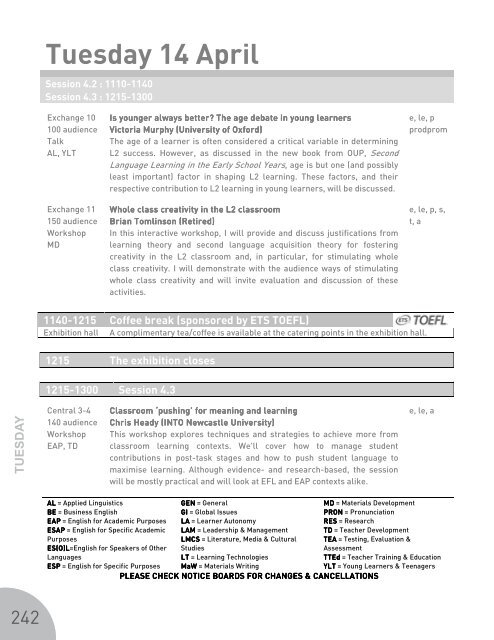Create successful ePaper yourself
Turn your PDF publications into a flip-book with our unique Google optimized e-Paper software.
Tuesday 14 April<br />
Session 4.2 : 1110-1140<br />
Session 4.3 : 1215-1300<br />
Exchange 10<br />
100 audience<br />
Talk<br />
AL, YLT<br />
Is younger always better? The age debate in young learners<br />
Victoria Murphy (University of Oxford)<br />
The age of a learner is often considered a critical variable in determining<br />
L2 success. However, as discussed in the new book from OUP, Second<br />
Language Learning in the Early School Years, age is but one (and possibly<br />
least important) factor in shaping L2 learning. These factors, and their<br />
respective contribution to L2 learning in young learners, will be discussed.<br />
e, le, p<br />
prodprom<br />
Exchange 11<br />
150 audience<br />
Workshop<br />
MD<br />
Whole class creativity in the L2 classroom<br />
Brian Tomlinson (Retired<br />
Retired)<br />
In this interactive workshop, I will provide and discuss justifications from<br />
learning theory and second language acquisition theory for fostering<br />
creativity in the L2 classroom and, in particular, for stimulating whole<br />
class creativity. I will demonstrate with the audience ways of stimulating<br />
whole class creativity and will invite evaluation and discussion of these<br />
activities.<br />
e, le, p, s,<br />
t, a<br />
1140-1215 Coffee break (sponsored by ETS TOEFL) LOGO<br />
Exhibition hall A complimentary tea/coffee is available at the catering points in the exhibition hall.<br />
1215 The exhibition closes<br />
1215-1300 Session 4.3<br />
TUESDAY<br />
Central 3-4<br />
140 audience<br />
Workshop<br />
EAP, TD<br />
Classroom ‘pushing’ for meaning and learning<br />
Chris Heady (INTO Newcastle University)<br />
This workshop explores techniques and strategies to achieve more from<br />
classroom learning contexts. We'll cover how to manage student<br />
contributions in post-task stages and how to push student language to<br />
maximise learning. Although evidence- and research-based, the session<br />
will be mostly practical and will look at EFL and EAP contexts alike.<br />
e, le, a<br />
AL = Applied Linguistics<br />
BE = Business English<br />
EAP = English for Academic Purposes<br />
ESAP = English for Specific Academic<br />
Purposes<br />
ES(O)L=English for Speakers of Other<br />
Languages<br />
ESP = English for Specific Purposes<br />
GEN = General<br />
GI = Global Issues<br />
LA = Learner Autonomy<br />
LAM = Leadership & Management<br />
LMCS = Literature, Media & Cultural<br />
Studies<br />
LT = Learning Technologies<br />
MaW = Materials Writing<br />
MD = Materials Development<br />
PRON = Pronunciation<br />
RES = Research<br />
TD = Teacher Development<br />
TEA = Testing, Evaluation &<br />
Assessment<br />
TTEd = Teacher Training & Education<br />
YLT = Young Learners & Teenagers<br />
PLEASE CHECK NOTICE BOARDS FOR CHANGES & CANCELLATIONS<br />
242


